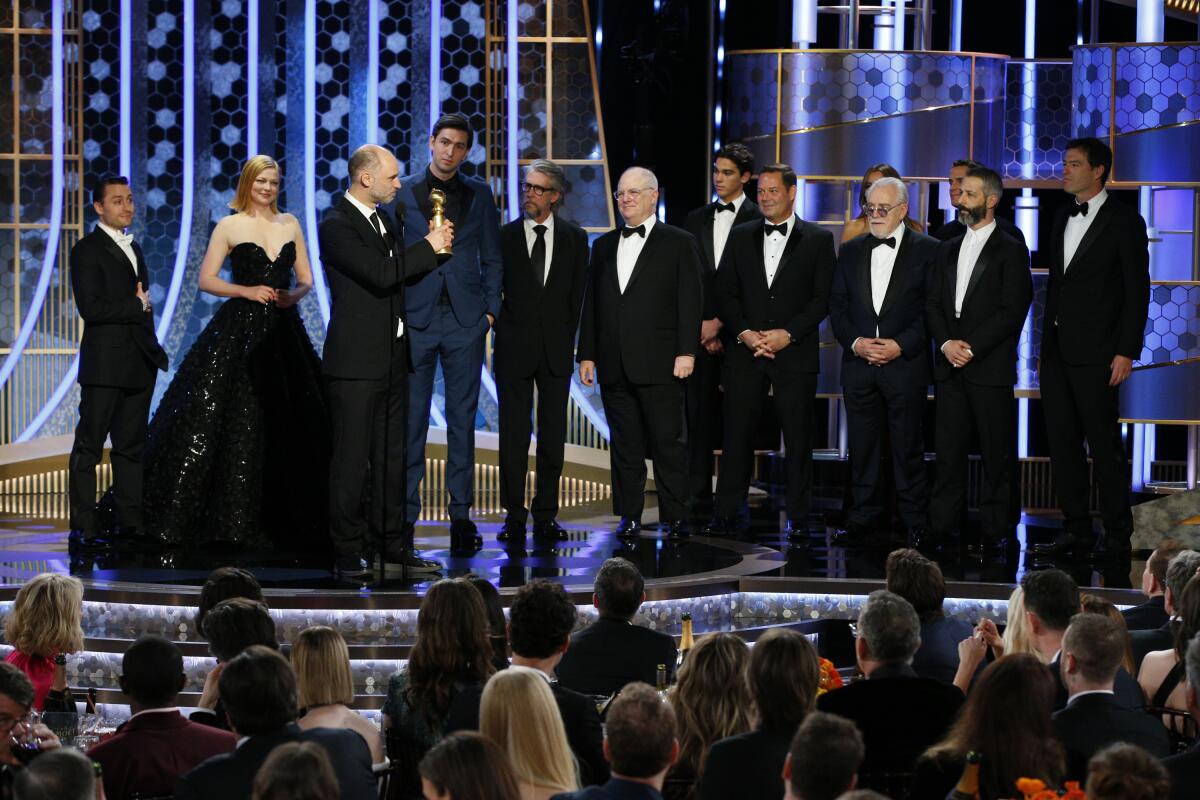Give the Golden Globes a chance to reform

- Share via
The beleaguered Hollywood Foreign Press Assn., best known for the Golden Globes awards, has been undergoing a much-deserved and long-overdue reckoning. A report in the Los Angeles Times in February revealed transgressions in the way the tiny membership — currently 84 people — of mainly foreign journalists covering the entertainment industry for foreign media outlets does its work.
The HFPA allowed studios to pay for members’ hotel rooms and food on visits to movie or TV sets or on other junkets. A few members were accused of acting unprofessionally at news conferences. Though the association gives away millions to schools and arts groups through its philanthropy, it also paid $1.9 million to its own members in 2020 to do time-consuming work on committees.
And on top of all that, the group has no Black members, at a time when anti-Black racism is at the center of cultural discussions around the world.
In the wake of that Times report, the association has been all but banished. Powerful publicists stopped making actors and filmmakers available for HFPA members’ news conferences. And NBC dropped the show, at least for the telecast that had been scheduled for January 2022.
Now, with the help of diversity consultants, lawyers and other advisors, the HFPA has undertaken reforms, drawing up new bylaws, a code of conduct, a gift policy and a conflict of interest policy. There will be elections for a new board of 15 directors — with three from outside both the association and the entertainment industry. A professional chief executive — also from outside the group and the world of entertainment — will be hired by the board of directors. There will also be a diversity officer.
Each member must now present at least eight pieces of work during the course of a year to stay in or join the association. (That’s up from six.)
A representative for the organization acknowledged that HFPA members in the past accepted free hotel stays and meals but noted that some entertainment publications do the same. (The Los Angeles Times does not permit its critics or reporters to accept any freebies.)
Now, the HFPA says, studios will not be allowed to pay for hotels. The HFPA will pay for its members’ airfare, food and lodging. Members will no longer be permitted to take selfies with actors at news conferences. Nor will members be permitted to accept gifts from studios, publicists, actors, directors or anyone else associated with a movie or TV show.
It’s unfortunate that the HFPA is keeping its practice of compensating members for committee work — such as setting up and moderating news conferences. The work may be extensive, and their own pay as journalists meager, but the bottom line is that the HFPA is using the broadcast fees for putting on the Golden Globes on themselves. The group insists the compensation is not excessive, but it nonetheless looks bad; the HFPA should instead hire outside staff for professional services.
In fairness, the HFPA faces the challenge of surviving in an era of dwindling journalistic outlets. Gone are the days when numerous overseas newspapers had full-time entertainment correspondents on salary. Today, most HFPA members are freelancers and some may earn less money from their journalism than from their committee work. No bylaw or code of conduct can fix the broken economics of journalism.
The association’s diversity problems are glaring, but it would be wrong to characterize the HFPA as an association of old white men. About 60% of its members are women — some of whom have served as officers, including president. And because they come from around the world, they are white, Latin, Asian and Arab.
The organization has reached out to the National Assn. of Black Journalists for help in recruiting Black journalists. Dialogue is fine, but there is no excuse for the HFPA not to have Black members.
One thing that may help is another change in the HFPA rules. Journalists based anywhere in the U.S., not just Southern California, will now be considered for membership — as long as they are reporting for foreign media. (Americans are allowed to join the HFPA, but only if they work for foreign press.) In addition, the association is lowering barriers to entry, such as onerous recommendation requirements, and seeking to expand and diversify its membership.
The industry should give the HFPA a chance to implement its new standards. The organization, which began in 1943, has a respectable history; past members interviewed Marilyn Monroe and Audrey Hepburn. The HFPA deserves a chance to get its act together.
More to Read
A cure for the common opinion
Get thought-provoking perspectives with our weekly newsletter.
You may occasionally receive promotional content from the Los Angeles Times.









